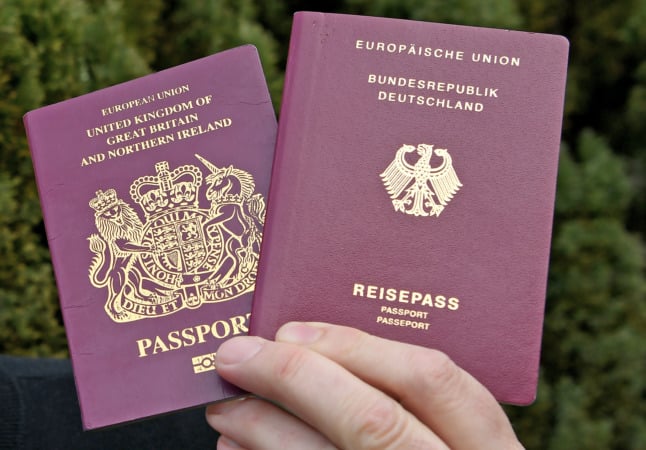Why are Brits moving to Germany after Brexit?

Despite the hurdles of moving to the EU after Brexit, thousands of Brits applied for residence permits in Germany last year. New immigration data sheds light on why they chose to move.
After the seemingly endless Brexit negotiations and the two-year transition phase, free movement for Brits in the EU finally ended on December 1st, 2021. Since then, Britons have required a residence permit to live and work in European Union countries like Germany - just like any other third-country nationals.
Pre-Brexit, of course, people with a British passport could simply move to Germany or any EU country without needing to apply for a residence permit beforehand. This gave them the flexibility to move without a job offer or change paths while in the country, for example by starting as a student and then becoming a freelancer.
READ ALSO: Do Brits need to carry a residence permit at the German border after Brexit?
The Local's Germany in Focus podcast recently spoke to a British couple who decided to up sticks and move to Germany after free movement had ended. They spoke about the hurdles they had to clear to get their residence permits - and the difficulty of doing it as a non-EU national after Brexit.
🎧 Latest episode:
- How Brexit has hit Brits in Germany (we chat to a couple)
- Major immigration reform
- German sick note culture
- Tax deadlines and deductions
- Alternative summer activities
Listen & Follow: https://t.co/v9JsOYVHYP pic.twitter.com/e2Gyuw60N9
— Germany in Focus (@germanyinfocus_) June 26, 2023
However, the most recent data released by the EU data agency Eurostat demonstrates that there's still an appetite among Brits to leave their home country and settle in the European Union.
As Eurostat's data reveals, tens of thousands of Brits still decided to move to EU countries last year, with a total of 43,497 gaining first-time residence permits in 2022 - or 46,977 with the inclusion of Switzerland.
Of these, more than 6,000 gained residence permits in Germany.
Eurostat considers a first residence permit an authorisation to stay in the territory of an EU country issued for the first time and valid for at least three months - so in most cases they are issued to new or recent arrivals who intend to live in the country, rather than just pay an extended visit.
The data shows how many people moved to these countries for work, study, family reunions or 'other reasons' (which includes retirement or any kind of residence without the right to work), international protection (Ukrainians excluded) or other special residence schemes.
READ ALSO: Reader question: Is my British residency title the same as permanent residency in Germany?
In the majority of countries, most people who fall under the 'other' category are retirees.
What were the main reasons Brits moved to Germany?
Though making a decision to move abroad can be based on a variety of factors - many of which are intangible - Eurostat's data is based on immigration statistics alone.
When third-country nationals apply for a residence permit, they generally have to state a reason for needing to be in the country - whether that's work or joining a loved one - and these responses were used in the Eurostat report.
That means someone who moved to Germany for a better quality of life or because they love the culture here unfortunately aren't represented in these stats.
That said, they do provide a good amount of insight into what Brits are doing here and how they went about moving - and offer clues to their main reasons for picking Germany.

A dual British and German national holds up their passports. Under proposed new rules, Brits will be able to take on German citizenship after living in Germany for five years, while retaining UK nationality. Photo: picture alliance/dpa | Holger Hollemann
According to the Eurostat data, far and away the two biggest reasons for Brits to move to Germany in 2022 were employment opportunities and 'other' reasons - which generally means retirement.
In fact, with 2,868 residence permits falling into the 'other' category, it appears Germany is only second to Spain as a post-Brexit destination for Brits in later life.
READ ALSO: EXPLAINED: How can Brits visit or move to Germany post-Brexit?
Unsurprisingly for Europe's largest economy, the second most popular reason for Brits to move to Germany was for work.
In 2022, 1,800 work permits were handed out to British citizens in the Bundesrepublik, putting it behind France (3,182 permits) and Switzerland (2,073 permits) as the third most popular EU destinations for Brits to take up a job offer post-Brexit.
With Germany attempting to tackle its ever-widening skills gap and lure qualified workers into the country with simpler immigration rules, it's likely that this number will increase in the future.
What about employment and family reunification?
With young Brits facing tuitions fees of up to £9,250 (€10,790) per year, you might imagine that Germany's fee-free universities would draw plenty of students into the country.
Strangely enough, though, the number of Brits coming to Germany for study was negligible in 2022, with just 506 residence permits handed out for this purpose.
This could have something to with the scrapping of the Erasmus student exchange programme in the UK after Brexit - but may also suggest that young Britons simply see Germany as a less romantic place to study than other EU countries.

People walk over the university coat of arms in the Philological Library of the Freie Universität Berlin. Photo: picture alliance/dpa | Christoph Soeder
In addition, though many courses in Germany are run in English, young Brits may be put off by the idea that they require German language skills - when they are much more likely to know French or Spanish.
Indeed, the two most popular destinations for Brits to study in after Brexit were France, which handed out 1,901 student permits, and Spain, which handed out 1,811.
READ ALSO: EXPLAINED: How to get a freelance visa for Germany from outside the EU
When it came to family reunification, the numbers were also relatively low - potentially due to Germany's notoriously tough family reunification laws.
In 2022, just 831 Brits applied for this type of visa when moving to Germany.
Comments
See Also
After the seemingly endless Brexit negotiations and the two-year transition phase, free movement for Brits in the EU finally ended on December 1st, 2021. Since then, Britons have required a residence permit to live and work in European Union countries like Germany - just like any other third-country nationals.
Pre-Brexit, of course, people with a British passport could simply move to Germany or any EU country without needing to apply for a residence permit beforehand. This gave them the flexibility to move without a job offer or change paths while in the country, for example by starting as a student and then becoming a freelancer.
READ ALSO: Do Brits need to carry a residence permit at the German border after Brexit?
The Local's Germany in Focus podcast recently spoke to a British couple who decided to up sticks and move to Germany after free movement had ended. They spoke about the hurdles they had to clear to get their residence permits - and the difficulty of doing it as a non-EU national after Brexit.
🎧 Latest episode:
— Germany in Focus (@germanyinfocus_) June 26, 2023
- How Brexit has hit Brits in Germany (we chat to a couple)
- Major immigration reform
- German sick note culture
- Tax deadlines and deductions
- Alternative summer activities
Listen & Follow: https://t.co/v9JsOYVHYP pic.twitter.com/e2Gyuw60N9
However, the most recent data released by the EU data agency Eurostat demonstrates that there's still an appetite among Brits to leave their home country and settle in the European Union.
As Eurostat's data reveals, tens of thousands of Brits still decided to move to EU countries last year, with a total of 43,497 gaining first-time residence permits in 2022 - or 46,977 with the inclusion of Switzerland.
Of these, more than 6,000 gained residence permits in Germany.
Eurostat considers a first residence permit an authorisation to stay in the territory of an EU country issued for the first time and valid for at least three months - so in most cases they are issued to new or recent arrivals who intend to live in the country, rather than just pay an extended visit.
The data shows how many people moved to these countries for work, study, family reunions or 'other reasons' (which includes retirement or any kind of residence without the right to work), international protection (Ukrainians excluded) or other special residence schemes.
READ ALSO: Reader question: Is my British residency title the same as permanent residency in Germany?
In the majority of countries, most people who fall under the 'other' category are retirees.
What were the main reasons Brits moved to Germany?
Though making a decision to move abroad can be based on a variety of factors - many of which are intangible - Eurostat's data is based on immigration statistics alone.
When third-country nationals apply for a residence permit, they generally have to state a reason for needing to be in the country - whether that's work or joining a loved one - and these responses were used in the Eurostat report.
That means someone who moved to Germany for a better quality of life or because they love the culture here unfortunately aren't represented in these stats.
That said, they do provide a good amount of insight into what Brits are doing here and how they went about moving - and offer clues to their main reasons for picking Germany.

According to the Eurostat data, far and away the two biggest reasons for Brits to move to Germany in 2022 were employment opportunities and 'other' reasons - which generally means retirement.
In fact, with 2,868 residence permits falling into the 'other' category, it appears Germany is only second to Spain as a post-Brexit destination for Brits in later life.
READ ALSO: EXPLAINED: How can Brits visit or move to Germany post-Brexit?
Unsurprisingly for Europe's largest economy, the second most popular reason for Brits to move to Germany was for work.
In 2022, 1,800 work permits were handed out to British citizens in the Bundesrepublik, putting it behind France (3,182 permits) and Switzerland (2,073 permits) as the third most popular EU destinations for Brits to take up a job offer post-Brexit.
With Germany attempting to tackle its ever-widening skills gap and lure qualified workers into the country with simpler immigration rules, it's likely that this number will increase in the future.
What about employment and family reunification?
With young Brits facing tuitions fees of up to £9,250 (€10,790) per year, you might imagine that Germany's fee-free universities would draw plenty of students into the country.
Strangely enough, though, the number of Brits coming to Germany for study was negligible in 2022, with just 506 residence permits handed out for this purpose.
This could have something to with the scrapping of the Erasmus student exchange programme in the UK after Brexit - but may also suggest that young Britons simply see Germany as a less romantic place to study than other EU countries.

In addition, though many courses in Germany are run in English, young Brits may be put off by the idea that they require German language skills - when they are much more likely to know French or Spanish.
Indeed, the two most popular destinations for Brits to study in after Brexit were France, which handed out 1,901 student permits, and Spain, which handed out 1,811.
READ ALSO: EXPLAINED: How to get a freelance visa for Germany from outside the EU
When it came to family reunification, the numbers were also relatively low - potentially due to Germany's notoriously tough family reunification laws.
In 2022, just 831 Brits applied for this type of visa when moving to Germany.
Join the conversation in our comments section below. Share your own views and experience and if you have a question or suggestion for our journalists then email us at [email protected].
Please keep comments civil, constructive and on topic – and make sure to read our terms of use before getting involved.
Please log in here to leave a comment.